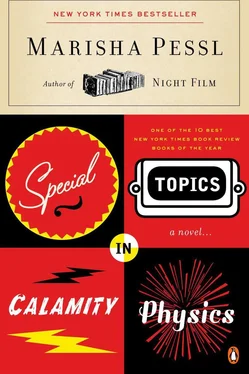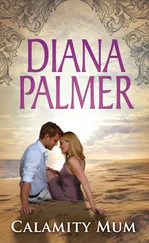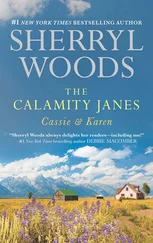In numb silence, we climbed into the car and waited another fifteen minutes for Jade.
“I made a statement,” she said proudly as she climbed into the backseat, mashing me against Nigel as she pulled the door closed. “It was exactly like TV only the cop wasn’t hot or tan.”
“What was he?” asked Nigel.
Jade waited until our eyes were crawling all over her.
“Lieutenant Arnold Trask was a pig.”
“You see the guy who died?” asked Milton from the front seat.
“I saw everything,” she said. “What do you want to know? First thing I’ll tell you, which I found really weird, was that he was blue. I’m not even kidding. And the arms and legs just flopped there. Arms and legs don’t usually flop, you know what I mean? He was inflated like a raft. Something had blown him up a little—”
“If you don’t stop I’m going to be sick,” said Leulah.
“What?”
“Did you see Hannah?” asked Charles, starting the car.
“Sure,” said Jade, nodding. “That was the worst of it. They brought her outside and she started screaming like some clinically insane person. One of the officers had to take her away. I felt like I was watching an after-school special about a mother who’s not granted custody of her kids. After that I didn’t see her. Someone said the guy from the ambulance gave her a sedative and she went to lie down.”
In the pale blued morning, hundreds of bare trees crowded the guardrail, nodding at us, extending condolences. I could see Charles clenching his jaw as he turned onto the highway, heading back to Jade’s. His cheek looked unusually hollow, as if someone had hacked at it with a knife. I thought about Dad, those awful instances he fell into a Bourbon Mood with The Great White Lie (Moon, 1969) or E. B. Carlson’s Silence (1987) slung over his corduroy knee. He was known to mention what he rarely mentioned, how my mother died. “It was my fault,” he’d tell not me but my shoulder or leg. “Honestly, sweetheart. It’s disgraceful. I should have been there.” (Even Dad, who prided himself on never dodging anything, like many people, preferred to address a body part when drunk and afflicted.)
And I hated those moments, when Dad’s face, the one thing I secretly believed strong and permanent, fixed as volcanic rock Head Sculptures on Easter Island (if anyone was still going to be standing after nine hundred years, it’d be Dad). For a brief moment, in the kitchen, or in some corner of smudged darkness in his study, I saw him fragile and smaller somehow, human certainly, but forlorn, frail as tissue pages in a motel Bible.
Of course, he always recovered splendidly. He mocked his self-pity, quoted something about Man’s worst enemy being Himself. And even though, when he stood up, he was Dad again, Dad, my Man of the Moment, my Man Who Would Be King , he’d been highly contagious because I was moody for hours afterward. It was what accidental deaths did to people, made everybody’s sea floor irregular and uneven, causing tidal currents to collide, surge upwards, thereby resulting in small yet volatile eddies churning at everybody’s surface. (In the more dangerous cases, it created a lasting whirlpool in which the strongest swimmers could drown.)
There was no dinner at Hannah’s that Sunday.
I spent the weekend in a swampy mood: stifling afternoons of homework, thoughts about Death and Hannah leaching my head. I hated when people participated in what Dad called “Sing-along Sorrow” (“Everyone’s eager to mourn so long as it’s not their child who was decapitated in the car accident, not their husband stabbed by a gutter binger desperate for crack.”); yet when I read the brief article about Smoke Harvey in The Stockton Observer , staring at the accompanying photo (some horrific Christmas shot: tuxedo, grin, a forehead shiny as chrome), I couldn’t help but feel, if not Loss or Sadness, then a sense of Missed Conversation, what one felt on the interstate when seeing an arresting person sleeping in the passenger seat of a passing van, a secret cirrus-smudge on the window.
“So tell me,” Dad said dryly, folding down a corner of The Wall Street Journal to look at me, “how were your Joycean hooligans? You didn’t fill me in when you got home. Have you made it to Calypso yet?”
I was curled up on the couch by the window, trying to get my mind off the costume party by reading the British chick-lit classic One Night Stand (Zev, 2002), hidden within the larger hardback Thus Spake Zarathustra (Nietzsche, 1883–85), for Dad’s sake.
“They’re fine,” I said, trying to sound blasé. “How was Kitty?”
Dad had had a date with her, and the fact that their dirty wine glasses were still in the sink when I returned home (on the counter, an empty bottle of cabernet), I could presume whatever drunken delusion I’d entertained about Dad’s looming presence at Hannah’s party, decked out in the costume he himself had said made him “look like the love child of Marie Antoinette and Liberace,” was exactly that — a delusion. (Kitty wore copper lipstick, and judging from the bristly strand of hair I’d found clinging to the back of the couch in the library, she brutally assaulted her locks with Clorox. It was the color of a Yellow Page.)
Dad looked confounded by my question. “How shall I answer that? Let’s see. Well, she’s lively as ever.”
If I felt the Everglades, I couldn’t imagine what Great Dismal Swamp Hannah was trudging through, when she woke up in her strange blank bedroom in the night and thought about Smoke Harvey, the man whose arm she’d squeezed like a giddy teenager when she was on the stairs, a man now dead.
That Monday, however, I was marginally reassured when Milton found me at my locker after school. He said Charles had gone to see her on Sunday.
“How is she?” I asked.
“She’s okay. Charles said she’s still kinda in a state of shock, but otherwise peachy.”
He cleared his throat, stuck his hands in his pockets with ox-in-sun slowness. I suspected Jade had recently tipped him off to my feelings—“Gag’s gaga over you,” I could just hear her saying, “like so gone, like fix ated”—because lately, when he looked at me, a shabby smile drifted across his face. His eyes circled over me like old flies. I suffered no hope, no daydreams, that he felt anything similar to the way I did, which wasn’t lust or love (“Juliet and Romeo be damned, you can’t be in love until you’ve flossed your teeth next to the person at least three hundred times,” Dad said) but acute electricity. I’d spot him lumbering across the Commons; I’d feel struck by lightning. I’d see him in the Scratch and he’d say, “Howdy, Retch” instantly I was a light bulb in a series circuit. I wouldn’t have been surprised if, in Elton, when he trudged by my AP Art History class on his way to the infirmary (he was always on the verge of measles or mumps), my hair rose off my neck and stood on end.
“She wants to take us to dinner tonight,” he said. “Wants to talk about what happened. Can you make it at five?”
I nodded. “I’ll have to make up something good for my dad.”
He squinted. “What chapter are we on?”
“Proteus.”
He laughed as he turned away. His laugh was always a big bubble rising through a quagmire: one gurgle and it was gone.
Charles was right. Hannah was peachy.
At least she looked peachy initially, when Jade, Leulah and I were ushered by the maître d’ into the dining room and saw her waiting for us, alone at the round table.
She’d taken the others to Hyacinth Terrace restaurant before. It was where she took them for special occasions — birthdays, holidays, someone’s grand achievement on a Unit Test. The restaurant attempted, with the intensity of any dedicated Emergency Medicine physician, to resuscitate Victorian England with a “heady culinary voyage that artfully blends The Old with The New” (see www.hyacinthterracewnc.net). Housed in a pristine green and pink Victorian house, the restaurant was perched on one side of Marengo Mountain and resembled a depressed Yellow-shouldered Amazon Parrot desperate to return to its natural habitat. Walking in, one could see no sprawling view of Stockton from the giant fan-shaped windows, nothing but that notorious local fog frothing off the greasy chimneys of Horatio Mills Gallway’s old paper mill twenty-seven miles east (now Parcel Supply Corp.), a haze with a fondness for hitching a ride on a recurring Westerly and smothering Stockton’s valley like a maudlin lover in a humid hug.
Читать дальше












